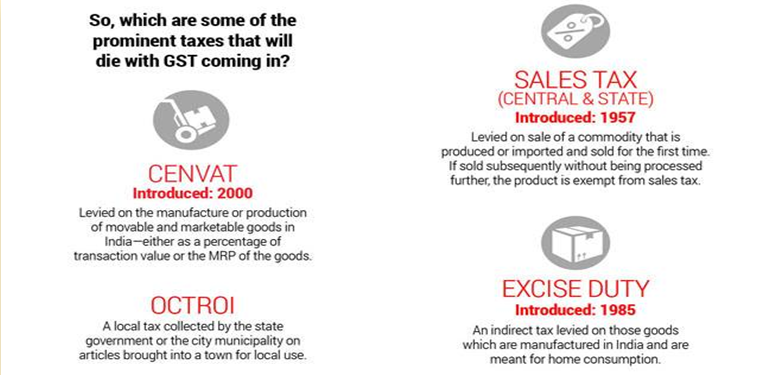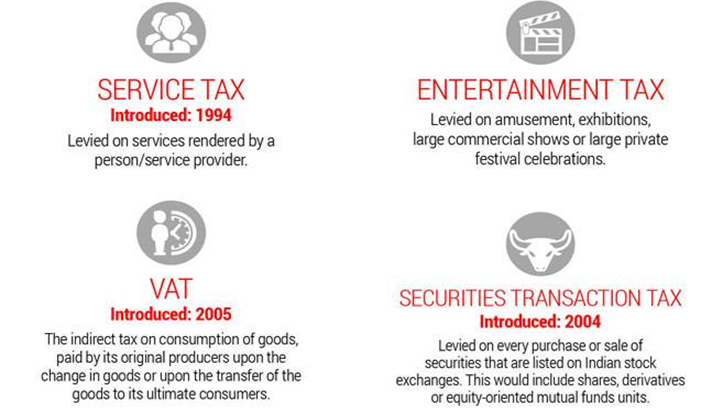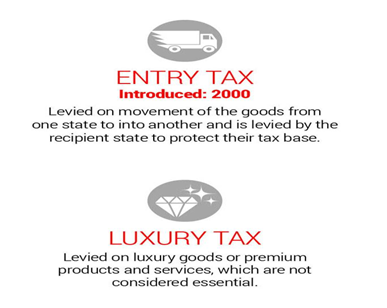
I. What is the GST Bill ? Here is all you need to know about India’s biggest tax reform
The Goods and Services Tax bill, touted to be India's biggest tax reform, will simplify the current system of taxation. The bill will convert the country into a unified market by replacing all indirect taxes with one tax.
a) What is GST? Why is there a need for this bill?
GST (Goods and Services Tax) is a tax levied when a consumer buys goods orservice. The current tax regime is riddled with indirect taxes which the GST aims to subsume with a single comprehensive tax, bringing it all under a single umbrella. The bill aims to eliminate the cascading effect of taxes on production and distribution prices on goods and services.
b) What is the cascading effect of taxation?
Cascading effect of taxes is caused due to levy of different charges by state and union governments separately. In the current multi-staged tax-structure, the following taxes are levied by the centre and state separately: Taxes levied by the centre include Income Tax, Service Tax, Central Sales Tax, excise duty and security transaction tax.
c) So, which are some of the prominent taxes that will die with GST coming in?

Taxes levied by the state include: VAT/sales tax, octroi, state excise, property tax, entry tax and agriculture tax


This tax structure raises the tax-burden on Indian products, affecting their prices, and as a result, sales in the international market. The new tax regime will therefore, help boost exports.
d) How will GST remedy the situation?
India is adopting a dual GST, where in the Central GST will be called CGST and State SGST.
Centre and state have to come to a consensus on uniform GST rates , inter state transaction of goods and services, administrative efficiency and infrastructural preparedness to implement the new tax reform.
e) So, what are the key benefits?
- India becomes a single market reducing cost and time on movement of goods.
- More tax revenues for the govt, yet lower tax burden for industry.
- Reduction in paperwork and time wasted in paying taxes.
- Lower prices for many manufactured products.
- Overtime, add between 2% and 2.5% to GDP.
- Increase exports between 10% and 14%.
f) How will GST affect the common man?
GST will change what we pay for most goods and services, since it will be applicable on nearly everything we consume. Currently, only alcohol and petroleum products have been kept out of the purview of the GST. Apart from that, the new GST rate which will be decided in the upcoming months, by the GST Council, will decide what we pay.
1) What will be Expensive?
- Eating Out
- Say goodbye to cheap calling on mobile phones
- Banking
- Insurance
- Clothes
- Jewellery
- Restaurant Bill
- Travelling
- Sporting events
- Ambulance Services
- Cultural Programmes
- Mobile calls
- Trucks
- Pilgrimages
- Luxury Cars
2) What will be cheaper?
- Online Shopping
- Acs, Fans,
- Mobile phones,
- LED TV’s
- Paint, Building materials
- Pharmaproducts
- Cement
- Buying a house
- Movie tickets
- Two-wheelers
- SUVs
- Solar Panels
- POS machines
- Fingerprint scanners.
- FMCG goods like shampoos, OTC drugs
- Readymade clothes
- Branded apparel
Conculsion:
The landmark GST bill is finally on its way to being a reality and the Central Government is all set to get it implemented PAN India by its deadline.
GST is supposed to streamline the countrie’s complicated indirect tax structure and eventually progress towards a single tax regime across the country. In the long run it will bring down costs, reduce economic distortions and serve to make India into a single unified market. The consumer ends up paying a lower price for goods and services as it removes incidences of double taxation or tax on tax.
Disclaimer:
The views of the authors/publishers should not be construed as advice. Investors must make their own investment decisions based on their specific investment objectives and financial positions and using qualified advisors as may be necessary. Opinions expressed in various articles are not necessarily those of Wealthmax Enterprises Management Private Limited(WEMPL) or any of its directors, officers, employees and personnel. Consequently, WEMPL or any of its directors, officers, employees and personnel do not accept any responsibility for the editorial content or its accuracy, completeness or reliability and hereby disclaim any liability with regard to the same. Stock picks and mutual fund snapshots are not exhaustive and should not be construed as recommendations.
